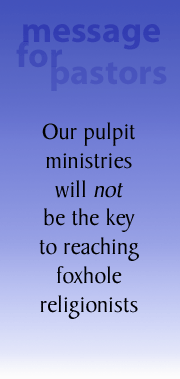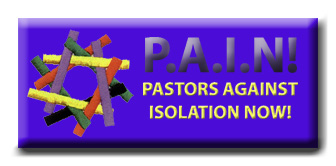
| Resources For You | Services We Offer | Our Organization | Páginas en Español |
| Welcome
to another special message for pastors. You may download a printable PDF file of this article. |

 |
||||
|
||||
|
| Updated Aug 3, 2007 |
|
 |
 Americans
Will Look For A Foxhole Americans
Will Look For A FoxholePreparing Our Congregations For The Next National Crisis Information and Comment
from Timothy Ministries
December 7, 2002 The Gist The spike in church attendance
after 9/11/2001 was an expression of foxhole religion. Church
attendance
in the U.S. returned to normal by Dec. 2001 and remains at pre-9/11
levels today. However, international crises will certainly intensify
and another attack upon the U. S. is likely. It behooves us, therefore,
to prepare our congregations for the next influx of visitors scrambling
for a foxhole. That preparation involves teaching our people that in
most cases a crisis visitor is only looking for momentary reassurance:
his or her greatest desire is for a return to normalcy — not a change
in lifestyle. The relative shallowness of the crisis visitor’s
spiritual
goals means that we must aggressively draw them into relationship. Our
people should plan ahead to invite newcomers home for dinner — and
invite
them into their lives — on the Sunday following a national tragedy.
For Those Who Have Time To Read More On Sept. 11, 2002, Fox News
reported, “The emotional pain and search for answers after Sept. 11 had
many flocking to religious services like never before. But, like many
of the initial post-attack phenomena, church attendance has since
returned to normal.…By some estimates, on the Sunday following the
terror attacks roughly half of the adult population in the United
States attended a religious service. But the attendance dropped off
starting in November.”
|
|
This is not
the
first time that American church attendance spiked after a national
crisis.
We’d forgotten that when the Gulf War started in 1990, church
attendance
suddenly increased and then quickly declined, just as it did last year.
Since
national upheavals will likely continue, we pastors must understand
this
foxhole religion phenomenon and prepare our congregations for its next
occurrence.
 “A year after 9-11,
Gallup Poll analyses…show that everything is business as usual in the
religious lives of Americans. The initial burst of religious enthusiasm
was short-lived, with church attendance and interest in God dropping
back to pre-terrorist attack levels.”
Preachers who gathered in Acton, Mass. last April to discuss 9/11,
reported seeing their people living as if nothing had ever happened.
“Such normalcy among the flock is disconcerting to shepherds, they
said, because it seems no incident of any magnitude can cause Americans
to turn from their ways of over-consumption, indifference to poverty or
unfettered self-indulgence.”
These pastors noted that, “Tragedies create panic responses, [but the
tragedies] themselves are not redemptive.” “A year after 9-11,
Gallup Poll analyses…show that everything is business as usual in the
religious lives of Americans. The initial burst of religious enthusiasm
was short-lived, with church attendance and interest in God dropping
back to pre-terrorist attack levels.”
Preachers who gathered in Acton, Mass. last April to discuss 9/11,
reported seeing their people living as if nothing had ever happened.
“Such normalcy among the flock is disconcerting to shepherds, they
said, because it seems no incident of any magnitude can cause Americans
to turn from their ways of over-consumption, indifference to poverty or
unfettered self-indulgence.”
These pastors noted that, “Tragedies create panic responses, [but the
tragedies] themselves are not redemptive.” This does not mean that 9/11 brought zero change. Churches do report some members pursuing a deeper spiritual commitment, and reaffirming the importance of family. However, significant numerical growth has only continued in churches that were growing before 9/11, and radical life-style changes have been rare. “People returning to the church after 9-11 soon discovered why they left in the first place,” said Bishop George McKinney of San Diego’s St. Stephen’s Church of God in Christ. “What a tragic commentary. People are seeking life, people are seeking truth, people are seeking integrity, something that’s real. Empty rituals will not satisfy the deep hunger in the hearts of men.” It’s true that churches must examine themselves and assess whether or not they were prepared to minister “life” and “truth” to an influx of visitors. “Among people who attend Christian churches, 41% said their church has done nothing at all since [September 2001] to address the attacks or their implications.” However, Bishop McKinney probably overestimates the depth of a crisis visitor’s spiritual quest. George Barna remarked, “The fact that we saw no lasting impact from the most significant act of war against our country on our own soil says something about the spiritual complacency of the American public.” Barna explained the worship attendance spike after 9/11 as a rallying of irregular church attenders, rather than an influx of new believers. “What we witnessed was the people who attend once every month or two suddenly returning on a consistent basis for a month or two before falling back into their regular pattern of irregular attendance,” he said. “It appears that very few people radically changed their personal agenda and added church involvement to their schedule when previously there had been no such activity.” Here’s what we need to understand: most of the people who made our church their foxhole after 9/11, were looking for momentary reassurance, and were not deep seekers after God. Their felt desire was for a return to normalcy, not for a relationship with Jesus — certainly not for a change in lifestyle. Some were Irregulars, church attenders who decided it was a good week to check-in with their church “home.” Others were Shallow Seekers, people who desired comfort from God but had no clue about what God desired from them. This does not mean God was not working in their lives! It does mean that we needed to take them more seriously before they climbed back out of the foxhole. We should not have assumed that they’d “seen the light” and that they would now get serious about God and church on their own. God works through relationship. As vital as our pulpit ministries are, they will not be the key to reaching foxhole religionists after the next national crisis. The key will be the relational aggressiveness of our congregations. We must teach our people now that a crisis visitor usually does not have compelling spiritual goals and needs the extra spiritual encouragement of a godly friendship. We must train our congregation now in the Living Room Principle, that is, we must train them to view their church foyer and auditorium as their own living room. As Pastor Tom Isenhart of Tacoma’s Puget Sound Christian Center has commented, “If strangers walked into your personal living room, you wouldn’t just ignore them and go on with what you were doing.” How true! When an unfamiliar family entered my home without knocking one morning and began taking off their shoes, I did not brush past them to talk to the more familiar members of my household. I made it my business to understand what our surprise visitors were after! Likewise, we must help ever church member take it personally when they see an unfamiliar face in their church building. Every church member must make it his or her business to learn about a new visitor, and draw them into relationship. It is only as we draw newcomers into lasting human friendship that they will find our offer of God’s friendship compelling. Wouldn’t it be great if we trained our congregations ahead of time to invite newcomers home for dinner — and invite them into their lives — on the Sunday following any national tragedy. Someone looking for a foxhole is going to jump into church. When they do, let’s surprise them with much more than they were looking for.  Sources The above quotes were taken from the following web articles: Fox News, Sept. 11, 2002 http://www.foxnews.com/story/0,2933,62674,00.html America’s Faith Waning After 9-11, October 10, 2002 http://www.prweb.com/releases/2002/10/prweb47771.php Preachers ponder: What’s the message after 9/11? By Jeffery MacDonald, Religion News Service, May 20, 2002 http://www.baptiststandard.com/2002/5_20/pages/post9_11.html 9/11: Churches popular again after falling off from Sept. 11 surge, By Nhia C. Yang, Sheboygan Press staff Reach Nhia C. Yang at nchengyang@smgpo.gannett.com and 457-7711 Ext. 135. http://www.wisinfo.com/sheboyganpress/news/911/911_5693905.shtml Christian leaders assert church failed to capitalize on 9-11 spiritual tsunami, By Staff Reporter CHRISTIAN TIMES http://www.christiantimes.com/Articles/Articles%20Sep02/Art_Sep02_02.html 9/11 Shows No Lasting Effect On Religion, Associated Baptist Press http://www.biblicalrecorder.org/content/news/2002/9_6_2002/ne060902shows.shtml Where Did They Go? http://lff.net/resources/culture/wherego.htm Half of All Adults Say Their Faith Helped Them Personally Handle the 9-11 Aftermath, September 3, 2002 http://www.barna.org/cgi-bin/PagePressRelease.asp?PressReleaseID=120&Reference=F |
| Home | Top |